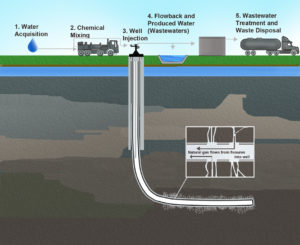 Fracking, or hydraulic fracturing, relies a lot on the use of liquids. But how does the industry sense the liquid levels in the first place? And how does fracking even work? We’ve taken a closer look at fracking and how level sensors play a role in the process.
Fracking, or hydraulic fracturing, relies a lot on the use of liquids. But how does the industry sense the liquid levels in the first place? And how does fracking even work? We’ve taken a closer look at fracking and how level sensors play a role in the process.
How Does Fracking Work
Fracking is a well stimulation technique. It works by first injecting high-pressure fracking fluid into a wellbore. This fracking fluid is primarily made up of water, but also contains sand, or other agents that are suspended with the help of thickening agents.
When the liquid is injected, it creates cracks in deep-rock formations. These cracks allow natural gas, petroleum, and brine to flow more freely. When the hydraulic pressure is removed from the well, then the small grains that were suspended in the fluid help hold the cracks open.
History of Hydraulic Fracturing
Fracking first began as an experiment in 1947. However, it wasn’t until 1950 that fracking actually became commercially successful. In 2012, about 2.5 million hydraulic fracturing jobs had been performed worldwide on oil and gas wells. And over 1 million of these jobs had been performed in the United States.
It wasn’t until recently that researchers found increases in seismic activity were directly linked to hydraulic fracturing. Most of this seismic activity is usually minor and only affects the region where the fracking is occurring.
How Liquid Level Sensors are Used
In fracking, accurate level sensing is needed when it comes to extracting oil and gas. More specifically, it’s important to have simple tank level sensors that can allow extractors to know tank levels at any given moment. This, in particular, can act as an early warning system for leaks or other issues that may occur.
Spills are expensive to clean up, which means that knowing if there’s even a small leak is important. By installing level sensors, fracking operations can ensure that they’re not only saving money, but they’re also doing their part to make sure that the environment is not suffering from a spill.





